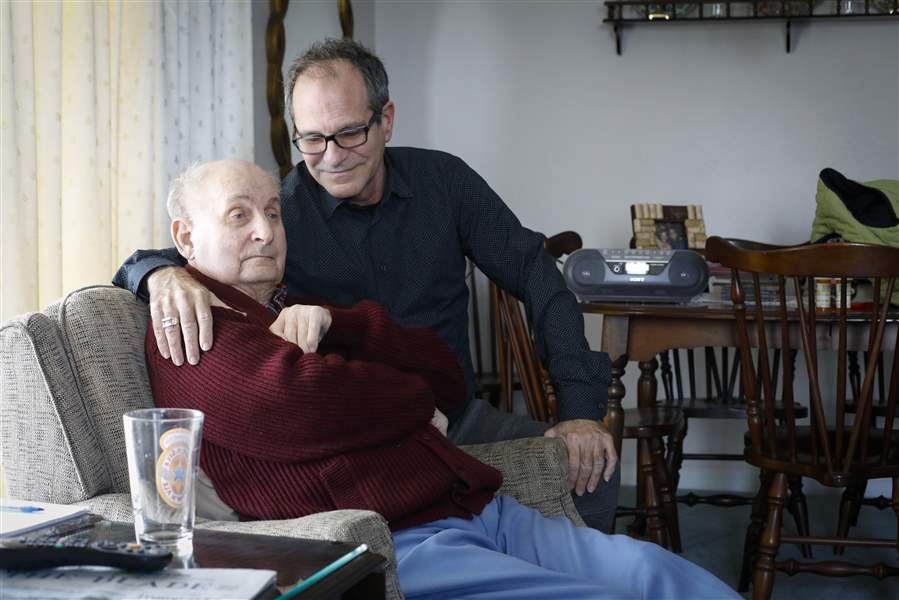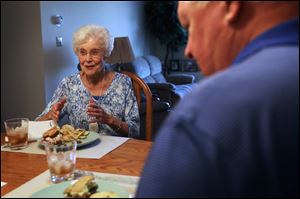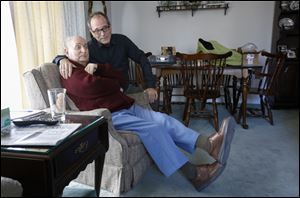
Families face delicate balance as they care for aging parents
6/3/2018
Matt Lentz and his 92-year-old father Phillip Lentz, watche television at the elder Lentz's home.
The Blade/Andy Morrison
Buy This Image
Phillip Lentz still lives in the home on Mellwood Court in West Toledo that he and his wife, Alice, bought more than 35 years ago. Mr. Lentz is 92 and suffers from dementia.
June Morgan is 93 years old and is a diabetic whose memory has been fading for the last three years. She resides at Alpine Village Assisted Living in Napoleon.

Rutha Marie Pinkston eats lunch with her son Bob Pinkston at West Park Place on Thursday, May 24, 2018. Bob placed his mother, Rutha Marie, in independent living in West Park after she broke both hips within 60 days
Rutha Marie Pinkston, 90, broke both hips within a couple of months last winter. She calls a one-bedroom apartment at West Park Place in West Toledo her home.
Where these senior citizens — who fought for their country, contributed to communities, and raised families — are living out the last years of their lives were choices that their adult children had to make as they transitioned into the role of caregiver for parents who used to do the same for them.
“Dad has always said he loved his house. It’s a ranch, so that works. He’s comfortable here; he knows his way around. I told him we would do this as long as we could,” said Matt Lentz, 62, Phillip’s son and caregiver. “You could always count on him; he was always there to help. I’m just trying to repay some of that.”
It’s been a seven-year process for father and son after the younger Mr. Lentz noticed that his father, a World War II U.S. Army Air Corps veteran who grew up in South Toledo and worked as a mechanic for DuPont for more than 40 years, was showing signs of dementia.
Matt Lentz started out by contacting the Area Office on Aging of Northwestern Ohio, which helped established the type and frequency of care his dad would need.
A daily routine
Matt arrives every morning to greet his father, help him get up and help him dress. Two days a week, he takes him downtown to work with him for a few hours before taking him home to meet up with one of two caregivers he hired to help.
Matt returns most nights after work to get his father ready for bed. The caregivers give him breaks a few times a week. Matt’s son, Jordan, spends nights with his grandfather.
A daily routine has been established. Phillip takes medication for his memory, blood pressure, and prostate, then watches the Andy Griffith Show, Bonanza, or Gunsmoke. Hot lunches through a program with the Area Office on Aging are delivered. In the afternoon, Phillip often listens to ’40s music on Sirius radio or tennis or golf if either is being televised. Caregivers perform sensory exercises with Phillip such as building Legos and puzzles and creating color wheels from paint samples. A military veteran visits for two hours once a week and tries to connect with Phillip that way.
WATCH: Families face a delicate balance as they care for aging parents
Matt, director of marketing and programming with the Valentine Theatre, is grateful for his flexible work schedule. He finds himself catching up at home on evenings and weekends.
“If I had a 9 to 5 job with hourly appointments, I’m not sure we could do this [this way],” Matt said. “We just found a pace that kind of works for us. It’s making everything work on a day-to-day basis.”
Matt Lentz is not alone in serving as a caregiver. According to 2013-14 data from the Pew Research Center, 40.4 million Americans provided unpaid care to an adult 65 or older; nine out of 10 of those cared for were an aging relative. Of that 36 million, almost half of them were helping one or both parents.
It’s a difficult and often taxing journey, all involved say.
Role reversal
At West Park Place on Executive Parkway, Executive Director Kirsten Pickle helps older adults transition into new homes. The facility operates on an “aging in place” policy, meaning care is provided to them in the same apartment where they originally moved even as their needs increase.
“It can be very emotional. It’s often the adult child who makes the first call or first visit … I would say 75 percent of the time,” Ms. Pickle said. “It’s really, really difficult to reverse those roles of parents and child, and sometimes it is almost a complete role reversal.”
Rutha Marie Pinkston, who goes by her middle name, lives in a 600-square foot, one-bedroom apartment at West Park Place that she moved into earlier this year after suffering two medical setbacks.
Her son, Bob Pinkston, and his wife, Carolyn, brought his mother from her home in Bridgman, Mich., to stay with them over the Thanksgiving weekend, as they did most holidays. This time, though, she stayed.
She fell getting out of bed and broke a hip. She broke a hip again in January. She gets around with a walker, and her short-term memory is starting to fail.
The Pinkstons say the decision to move Marie into a facility was not difficult. Bob still works and said the three-hour drive between their home and his mother’s was too far to be there as much as he wanted to be. Their home in Old Orchard has multiple floors, with no bedrooms on the first level.
“The decision with Mom was based on our concern about her safety and to be able to care for her,” he said. “I couldn’t be there every day, and now I can.”
About six years ago, they started looking for a place for his mom to call home — as well as a place for Carolyn’s mom and dad in Florida. Marie worked as a bookkeeper much of her life and married Bob’s dad, Eugene, in 1947. He died in 2012.
“We knew we were on borrowed time,” her son said.
Bob and Carolyn are frequent visitors at West Park Place, bringing his mother grocery staples for her kitchen, going over her financial information, and enjoying meals with her. They take her to their house on Sundays for family meals and take trips to local parks and doctor appointments. They said they tried to replicate her home life as much as possible, including moving some of her furniture from her lifelong home to the apartment and peppering the living room with framed photos of kids, grandkids, and great-grandkids.
A lifelong practicing Baptist, Marie said she relied heavily on her faith during the transition.
“I did a lot of praying. The Lord has walked with me daily all these years, and I don’t think he’s going to stop now. I’m contented here,” she said, looking around her apartment. “I pray every night, Lord, if this needs to be my home, if you say it needs to be, then it is.
“Of course I miss my home and my church and my friends, but Bob would be making too many long trips, and I couldn’t have that.”
Caregiver help
Bob is an only child, but Carolyn has siblings. She said organizing paperwork, planning early, and talking to those involved are key.
“Have those conversations [with parents and siblings] which are difficult, because nobody wants to talk about those eventualities,” she said. “If I could give one piece of advice, it would be to try to plan ahead a little bit. You have to have a group buy-in.”

Matt Lentz and his 92-year-old father Phillip Lentz, watche television at the elder Lentz's home.
Arcelia Armstrong coordinates the Caregiver Support Program at the Area Office on Aging, a national program implemented as part of the Older Americans Act of 2000. The office offers services that range from educational support to program information to financial advice. It hosts an annual caregiver expo every November, has a volunteer respite program to give family caregivers breaks throughout the week, and offers free monthly talks on topics important to family caregivers.
“The whole purpose is really to help support the caregiver through their caregiving journey,” Ms. Armstrong said. “Common challenges of family caregiving include everything from managing their time, to some caregivers might still be employed and working so they are trying to juggle that, and the emotional and physical stress that family caregiving can take.
“The financial strain is another common challenge family caregivers face because they are often digging in their own pockets to cover expenses for their loved one. Sleep deprivation is another one that can take a toll on caregivers. The other challenge we find sometimes, too, is that caregivers are afraid to reach out and ask for help.”
Making decisions
For Betsy Morgan and her two sisters, caring for Mom has been ongoing for almost two decades. June Morgan’s husband, William, died in 1996. The sisters moved their mother to a small apartment in 2002 after the arthritis in her knees started getting the best of her, Betsy Morgan said.
In 2009, they moved her again, this time to an independent living facility apartment at Riverview Terrace in Napoleon. Nurses and aides came in Monday through Friday to administer medicine, do some light housekeeping, and provide companionship. Betsy performed those tasks on weekends and holidays.
She stayed there until last month, when they noticed a change. The dementia was getting worse.
“She wasn’t eating; she wasn’t getting out of bed to let the aide in,” Betsy Morgan said. “That last week I was going there, and she was getting Meals on Wheels for lunch, and they were piling up in the refrigerator. The food I got her on weekends, she hadn’t touched it.
“She probably forgot to eat. From what we had been seeing, we determined that she couldn’t be alone anymore.”
The daughters moved June into assisted living at Alpine Village. And although the decision gave them the assurance that she was eating three meals a day and now had help from a professional with the push of a button, it took an emotional toll.
“This has been very difficult. She has always said she did not want to go to a nursing home, and to her, this is the same thing,” she said. “She was angry. She would yell at us. She would cry. It made all of us feel awful. It’s one of the worst things I ever had to do. I hate to see her sad at the end of her life.”
Ms. Pickle said adults looking for the best care for a parent should pay attention to cleanliness of workers,and ensure the facility has a caring and informative staff and quality programming and services.
“Show up without an appointment and see how you are treated,” she said. “Talk to the residents who live there. Any community who is afraid to have you talk to the residents ... that’s not a good sign.”
Ms. Pickle said to narrow choices down to two or three facilities and to allow your parent a say, if he or she is capable.
“Often what’s most important to the adult child isn’t what’s important to the resident,” she said, noting that at a recent visit with a mother and daughter, the daughter remarked that the two most important things for her were that her mother was safe and that she could call and check on her.
“Her mom snapped up her head and said, ‘I don’t give a damn about those things; I don’t want to cook and clean,” she said.
Contact Roberta Gedert at rgedert@theblade.com, 419-724-6075, or on Twitter @RoGedert.